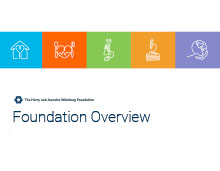Aging is one of the Foundation’s five focus areas for grantmaking. In this Q&A, the Foundation’s Aging team explains our priorities and goals — and the difference Weinberg hopes these investments will make.
Why does the Weinberg Foundation focus on aging?
Older adults are a vital part of our communities, representing nearly 20% of Americans and a growing share of the nation’s and world’s population. In a given year, about 25% volunteer in their communities, providing over 3 billion hours of service and an economic value estimated at $77 million. Many help their families by providing child care or even raising their grandchildren.
Yet a number of older adults live on a fixed income and struggle with maintaining their homes, meeting basic needs, and covering the rising cost of their health care. About 17 million Americans ages 65 and older (30%) are low income, and roughly 25% sacrifice needs — including food, utilities, clothing, or medication — to manage health care costs. In 2022, 37% worried about affording health care in the coming year. And millions are not taking advantage of public and private programs that offer assistance with making ends meet because they are unaware of such resources, unable to navigate the application process, or unsure they merit aid.
The Weinberg Foundation’s grantmaking to support older adults dates back to 1989, when Harry Weinberg donated $1 million for air conditioning in assisted living facilities for older Israelis. Ever since then, we have prioritized connecting older adults with the support and services they need to live independently and with dignity in their homes or broader community, whether that means having safe and accessible homes or access to quality health care.
What are the priorities of the Foundation’s grantmaking in this area?
- Ensuring older adults have safe, accessible homes. We support programs that enable individuals to remain in their homes, pairing general home modifications (e.g., installing ramps and grab bars) with services such as occupational therapy to help with basic activities (e.g., bathing and dressing). Since 2013, the Foundation has invested more than $22 million in home repairs for over 4,500 homes, allowing older adults to stay safely in their homes.
- Providing a range of services that enable people to age independently and stay active and engaged in their community. We fund efforts aimed at coordinating comprehensive medical and social services for older adults within their community, rather than having to move into a nursing home to receive the care they need. We also support inclusive affordable housing developments that welcome older LGBTQ+ individuals, who often experience stigma and discrimination, as well as quality affordable housing for people experiencing homelessness.
How has the Foundation’s grantmaking focused on aging evolved over time?
For years, the Foundation’s grantmaking focused on assisted living, palliative care, and nursing homes. However, about six years ago, we shifted to prioritize aging in community because we recognized that older adults want to remain in their homes, and even when they must move for accessibility needs, they still want to be in community and maintain their independence. While we always will need nursing homes, the Foundation now primarily supports older adults who are still active and capable of making decisions about how they want to live.

What are recent examples of grants in this area?
Safe, accessible homes: Developed at the Johns Hopkins University School of Nursing, the Community Aging in Place, Advancing Better Living for Elders (CAPABLE) program combines repair services with health and occupational therapy to improve independence and mobility, manage chronic symptoms, and decrease health care costs for older adults struggling with activities of daily living.
Similarly, Housing Upgrades to Benefit Seniors (HUBS) in Baltimore City provides home repair and modification services (e.g., grab bars and handrails in the bathroom and ramps to entry doors) for older adults’ homes. HUBS takes a no-wrong-door approach, meaning the program also connects participants with any other community services they may need, such as food assistance. Since its launch in 2015, HUBS has provided home repairs for over 3,000 older adults in Baltimore City and inspired the Baltimore County Age-Friendly Upgrades for Seniors (BCAUSE) program, which has already served more than 400 homeowners.
Comprehensive medical and social services: Through its centers across the nation, the Program of All-Inclusive Care for the Elderly (PACE) provides an age-friendly health system for individuals who need the level of care they would get in a nursing home, allowing most to continue living at home, have their needs met, and enjoy a high quality of life.
Affordable housing for LGBTQ+ older adults: SAGE is an affordable housing provider in New York City that developed the city’s first affordable senior housing welcoming LGBTQ+ residents. It has built over 1,000 units of such housing, with an additional 1,600 units in predevelopment. A new development underway in Baltimore will provide about 60–70 units, along with programs and services designed for LGBTQ+ individuals.
What does the future hold for the Foundation’s grantmaking in aging?
We aim to look beyond the number of older adults connected with different services and instead strengthen our focus on impact — that is, how these programs and services are changing people’s lives.
Harry and Jeanette Weinberg began the Foundation with some of their very first donations going to older adults. We are honored to continue their efforts to help ensure these individuals are able to continue contributing to and living in their communities, with dignity and respect.




